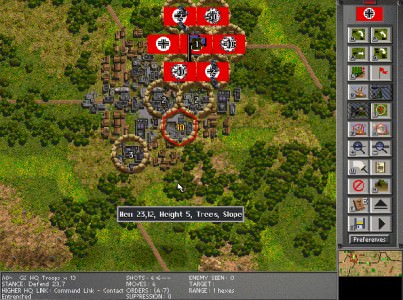Steel Panthers 3: Brigade Command (1939-1999)
Steel Panthers 3: Brigade Command (1939-1999) is the third part of the Steel Panthers series. As the name of the game shows, its main character (that is, you playing it) was promoted, and now he has become a brigade-division level commander. This increase reflects changes in the scale of the game: now 1 Unit is not a detachment, but a platoon of infantry or tanks (or other vehicles), a fire platoon of artillery, a couple or a link of airplanes (helicopters), and in one cell the cards are no longer tens, but hundreds of meters . The time frame of the game has also changed: it combines the previous 2 parts, that is, the period 1939-1999 (it is divided into two parts, as it were: in 1939-1945, 20 countries are participating in the war and US Marine Corps - well, where would it be without it !, - and in 1946-1999 - 40 countries, the USMC and some suspiciously familiar Red and Green, designating any countries that are allies of the Warsaw Pact and NATO, respectively).
In general, the historical and technical correspondence that is so characteristic of all parts of Steel Panthers has been preserved, although there are extremely ridiculous mistakes (for example, a hypothetical battle in which Germany attacks Poland in 1999). I must say that one of the features of the games in this series is the historical uniqueness of each part - there are no repetitive campaigns or individual battles anywhere.
Unlike the previous parts, this game has a campaign for the army of ANY country against any opponents (if you want - bring the Norwegian army to dominate the whole world, if you want - arrange a war of Turks and Japanese in China in 1980); a campaign can have up to several hundred fights - there would be a desire to lead them, and, in addition, in the editor you can create not only your own battles, but also entire campaigns. New historical campaigns appeared, including hypothetical ones, as well as individual battles - starting with the counterattack of the Polish troops near Kutno in September 1939 and ending with the “New Year” storming of Grozny by the Russian Army in 1994 ...

kittytoe
- 02-03-2021 14:29:07